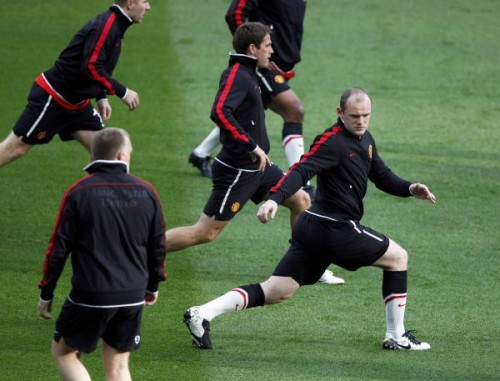One of the biggest problems soccer players face is packing on muscle. This is certainly something I struggled with when I was playing soccer. Between training, practice, and games, it’s hard to give the body what it needs to build muscle.
When you look at a soccer player, a lot of them look kind of small. This is a result of what we put our bodies through. We put our bodies under incredible amounts of stress and this stress can negatively impact bodily functions in a number of ways.
First, the exercise-induced stress can disrupt our hormones. The one hormone mainly associated with stress is cortisol. Stress increases the amount of cortisol our bodies create and it messes with our ability to think, our reaction time, and recovery. What this all boils down to is that we want to limit the amount of cortisol being pumped through our systems.
Second, the stress we put on our bodies through exercise puts our bodies in a catabolic state. Catabolism sounds a lot like metabolism right? Well, that’s because they’re related in that metabolism is our bodies breaking down nutrients from without to fuel itself, and catabolism is when our bodies break down nutrients within itself. Our bodies going catabolic is a result of the extreme amounts of running we do in training and in games. Take, for example, the typical long-distance runner. These athletes are generally small and while they may be defined due to a lack of body fat, they are far from the size it takes to be a force on the soccer pitch.
What I’m getting at is, soccer players need to have the stamina of a long-distance runner, but the explosive strength of a fullback in football. How we achieve this is tied to the diet, and the right supplements to accompany the diet.
Creatine: The All-Purpose Energy Supplement
Contents
Creatine is the right supplement for the job, but before we get into the ways in which creatine will benefit us, let’s talk about what creatine is and its effects on the body.
The textbook definition of creatine is that it is a “nitrogenous organic acid produced in the liver that helps supply energy to cells all over the body.”[1] Creatine travels throughout the body in the bloodstream and is used by the brain and muscles when there is a demand for energy. For soccer players, instead of pushing our bodies into a catabolic state, we can use the energy that creatine provides to prevent our bodies from breaking down muscle to fuel our performance.
Since creatine provides energy for both the brain and the body, the benefits that soccer players stand to gain from adding it to their diets is huge! For soccer players, creatine offers a lot, but most notably in three categories: packing on lean muscle, improving endurance, and enhancing cognitive function.
Packing on Lean Muscle
Since creatine provides the body with more ATP (energy our cells use to do work) that means we can push our bodies harder than we normally would be able to. The takeaway from this is, by pushing our bodies harder we can further break down our muscles, and demand our bodies to recover and build those muscles stronger than before.
This process is formally known as hypertrophy. Essentially, it is when micro-tears appear on our muscular tissue due to exercise-induced stress. When these micro-tears appear, our bodies must then work to repair these muscle tears, making the tissues larger in the process.
So creatine allows our bodies to work harder. We can produce explosive movements like sprinting, squatting, and the many other movements we go through in a training session or a game more readily with this supplement in our systems than without.
In this way, creatine is an essential supplement for soccer players. It provides our bodies with more energy so that we can push our bodies harder, and necessitate recovery so that we can become stronger and make what bodybuilders call “gains.”
Supplementing Endurance
The second way in which creatine is essential to the Optimal Soccer Diet is that it not only allows our bodies to pack on more muscle, it also improves endurance. As we have previously covered, creatine supplies our bodies with more ATP. More energy means that we can not only push our bodies harder but also sustain that level of intensity for longer.
Studies on the effects of creatine on cyclists show us that it does indeed allow for athletes to push themselves harder for longer.[2] While we are not cyclists, the results of the study can certainly be applied to soccer players. Being able to work harder for longer means we can get more out of each practice, out of each lifting session, and (more importantly) out of each game.
Enhancing Cognitive Function
While most athletes will be drawn to the muscle-building and improved endurance that creatine offers, the benefits of taking creatine on brain function should not be overlooked. Soccer demands more than just physical competence. It demands a mental fortitude and quick decision-making that is simply not present in other sports. When the heat is on you can’t miss a pass, not take a shot, or lose a man. In a game, you need to be on 100% both physically and mentally.
In this way, creatine offers soccer players a chance to improve their performance through cognitive function. Our brains use energy much like our muscles do, and creatine allows our minds to draw on additional stores of energy that boosts reaction time and decision-making.
The benefits of cognitive function apply to other aspects of performance. Through enhanced cognitive function, we can learn faster and retain this newfound knowledge more easily.
The Dangers of Creatine Loading
If you purchase creatine, there will be directions on how to effectively use it. On many bottles, there will be a suggestion to “creatine load.” What this entails is taking multiple doses of creatine throughout the day in hopes of giving the body more energy. This is a complete waste of your time and the precious supplement you spent money on.
Creatine loading is not terribly dangerous, but it is a waste. The most noticeable effect of creatine loading is water retention, or bloating. Large amounts of creatine make our muscles retain water, and the result is that we look bigger. The increase in size may be reassuring, but it is not functional. Creatine loading does not increase mass through more muscle, but from an increase in water weight. This is exactly what a soccer player does not need. Being heavier is only beneficial when that extra weight is derived from functional lean muscle. Extra water weight threatens to slow down a soccer player and decrease overall performance.
Instead of creatine loading, simply take 5 grams of creatine once a day. It takes time for the creatine to effect a change in our bodies, but in about a week the effects of creatine should take hold and we can begin getting stronger, building stamina, and enhance our cognitive function.
While creatine is an essential supplement soccer players ought to implement into their diets, it should be used in addition to a strong diet. All the supplements in the world will not help an athlete if proper nutrition isn’t taken care of. Taking care of the diet allows us to sprinkle supplements into our nutrition practices in order to become elite athletes. So once your diet is right, definitely, take the next step and supplement creatine to really increase performance.
Thank you for taking the time to read. I hope that this post on a powerful supplement gets you thinking about taking the necessary steps to become an optimal soccer player. As always, I enjoy hearing from you guys, so leave a comment below and we can discuss this further.
Until next time,
Casey
Head Trainer, Optimal Soccer
[1] http://www.medicalnewstoday.com/articles/263269.php
[2] http://www.menshealth.com/fitness/why-cyclists-should-take-creatine


